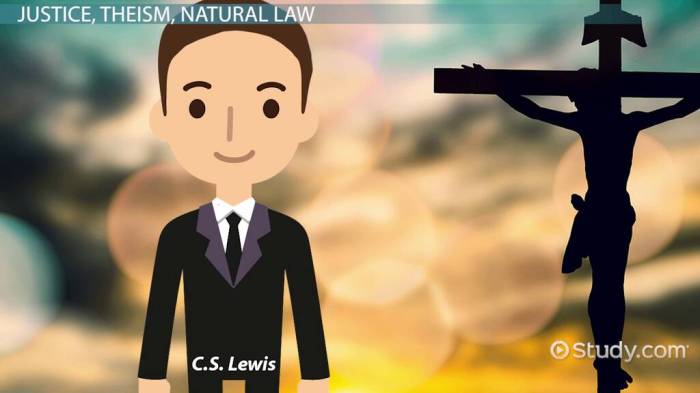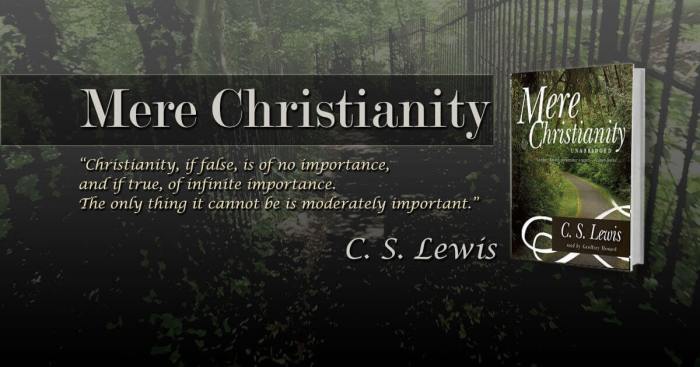Summary of mere christianity book 2 – Embark on a journey through C.S. Lewis’s Mere Christianity Book 2, where fundamental Christian beliefs intertwine with practical guidance for everyday living. This captivating exploration delves into the core teachings that shaped Lewis’s apologetic vision, offering a profound understanding of the Christian faith and its transformative power.
Through lucid explanations and compelling anecdotes, Book 2 unveils the central doctrines of Christianity, including the nature of God, the role of reason and faith, and the significance of moral living. Lewis’s unique perspective on the relationship between faith and reason provides a compelling framework for understanding the complexities of belief.
Book Overview

Book 2 of C.S. Lewis’s Mere Christianity focuses on the core beliefs of Christianity, aiming to provide a comprehensive understanding of the faith for those seeking to explore it. It explores fundamental concepts such as the existence of God, the nature of sin, the role of Jesus Christ, and the importance of morality and ethics.
Key Chapters and Their Significance
- “The Existence of God”:Examines arguments for and against God’s existence, including the cosmological, teleological, and moral arguments.
- “The Problem of Pain”:Addresses the issue of suffering and its compatibility with a benevolent God.
- “The Reality of Sin”:Explores the nature and consequences of sin, arguing that it is a universal human experience.
- “The Way to God”:Presents the central role of Jesus Christ in Christianity, discussing his life, teachings, and sacrifice.
- “The Christian Way of Life”:Artikels the ethical and moral implications of Christian beliefs, emphasizing the importance of love, forgiveness, and self-sacrifice.
Core Beliefs and Teachings

Book 2 of Mere Christianity emphasizes several central Christian beliefs:
The Existence of God
Lewis argues that the existence of God can be inferred from the order and complexity of the universe, the human experience of conscience, and the desire for meaning and purpose.
The Nature of Sin, Summary of mere christianity book 2
Lewis views sin as a fundamental flaw in human nature, a rebellion against God and a separation from the source of goodness. He emphasizes the universal nature of sin and its consequences, including guilt, shame, and alienation.
The Role of Jesus Christ
Lewis presents Jesus Christ as the central figure of Christianity, the Son of God who came to earth to redeem humanity from sin. He highlights Jesus’s teachings, his sacrificial death, and his resurrection as evidence of his divine nature.
The Christian Way of Life
Lewis argues that Christian beliefs have profound implications for daily living. He emphasizes the importance of love, forgiveness, humility, and self-sacrifice, viewing these virtues as essential for a meaningful and fulfilling life.
The Role of Reason and Faith
Lewis acknowledges the importance of both reason and faith in the Christian journey. He argues that reason can help us understand the world around us and provide evidence for the existence of God, but it is ultimately through faith that we come to know God personally.
Examples from Book 2
- Lewis uses the argument from design to support the existence of God, drawing parallels between the intricate workings of the universe and the design of a complex machine.
- He emphasizes the role of conscience in pointing us towards a moral law that transcends human experience, suggesting that this is evidence of a divine moral order.
- Lewis argues that faith is not a blind leap into the unknown but rather a reasonable response to the evidence and experiences that point towards the existence of God.
Practical Implications for Christian Living
The teachings of Book 2 have significant implications for everyday life:
Ethical and Moral Guidance
Lewis emphasizes the importance of Christian morality, arguing that it provides a framework for making ethical decisions and living a virtuous life. He highlights the virtues of love, forgiveness, and self-sacrifice as essential for a meaningful existence.
Overcoming Sin and Guilt
Lewis recognizes the struggle against sin and guilt as a fundamental part of the human experience. He presents the Christian message of forgiveness and redemption as a source of hope and healing for those who repent of their sins.
Finding Meaning and Purpose
Lewis argues that Christianity offers a sense of meaning and purpose to life. By aligning ourselves with God’s will and living according to his principles, we can find true fulfillment and purpose.
Comparison with Other Works
Book 2 of Mere Christianity complements and expands upon the ideas presented in other works in the series:
Relationship to Book 1
Book 2 builds upon the foundational arguments for the existence of God and the nature of morality presented in Book 1. It delves deeper into the core beliefs and teachings of Christianity.
Contribution to the Series
Book 2 is an integral part of Mere Christianity, providing a systematic exploration of Christian beliefs and their implications for daily living. It contributes to Lewis’s overall apologetic project by presenting a coherent and persuasive case for the truth of Christianity.
Cultural and Historical Context: Summary Of Mere Christianity Book 2
Book 2 of Mere Christianity was written during World War II, a time of great uncertainty and upheaval:
Impact of War
The war’s horrors and the questioning of traditional beliefs influenced Lewis’s writing. He sought to provide a reasoned and compelling defense of Christian faith in the face of widespread doubt and skepticism.
Christian Apologetics
Book 2 is part of Lewis’s broader apologetic project, which aimed to present Christianity as a rational and credible worldview. He wrote in response to the intellectual challenges of his time, seeking to engage with skeptics and non-believers.
Literary Style and Analysis

Lewis’s writing in Book 2 is characterized by:
Clarity and Accessibility
Lewis uses clear and concise language, making his arguments accessible to a wide audience. He avoids technical jargon and philosophical abstractions, aiming to communicate complex ideas in an engaging and understandable way.
Analogies and Illustrations
Lewis employs vivid analogies and illustrations to make his points relatable and memorable. He draws from everyday experiences, literature, and nature to help readers grasp abstract concepts.
Persuasive Techniques
Lewis uses rhetorical devices such as repetition, parallel structure, and emotional appeals to persuade readers of the truth of his arguments. He combines logical reasoning with personal anecdotes and appeals to the reader’s sense of wonder and awe.
FAQ Section
What is the main theme of Mere Christianity Book 2?
Book 2 focuses on the core beliefs and practical implications of the Christian faith, exploring the nature of God, the role of reason and faith, and the significance of moral living.
How does Lewis approach the relationship between faith and reason in Book 2?
Lewis argues that faith and reason are not mutually exclusive, but rather complementary. He believes that reason can lead us to the threshold of faith, while faith provides the final step into belief.
What practical guidance does Book 2 offer for Christian living?
Lewis emphasizes the importance of humility, forgiveness, and love in everyday life. He argues that by following these principles, Christians can live more fulfilling and meaningful lives.